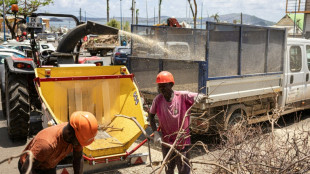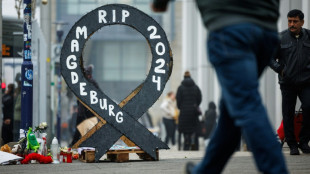
-
 Mexico probes public thanks to drug lord for children's gifts
Mexico probes public thanks to drug lord for children's gifts
-
Signs Christmas market attack suspect mentally ill: German minister

-
 Five years on, WHO urges China to share Covid origins data
Five years on, WHO urges China to share Covid origins data
-
Anger in Germany at Musk attempt to 'influence' election

-
 'Foreign jihadists' in Syria leader's pick for army officers: monitor, experts
'Foreign jihadists' in Syria leader's pick for army officers: monitor, experts
-
US announces $5.9 bn in military, budget aid for Ukraine

-
 Argentina charges five over death of singer Liam Payne
Argentina charges five over death of singer Liam Payne
-
Sporting deaths of the year -- Part II

-
 US prepares state honors for late president Jimmy Carter
US prepares state honors for late president Jimmy Carter
-
Shahidi, Bennett star as Afghanistan draw Zimbabwe Test

-
 LeBron James prepares to follow those who kept winning after 40
LeBron James prepares to follow those who kept winning after 40
-
Sporting deaths of the year -- Part I

-
 No Santa rally for stocks as equities slide
No Santa rally for stocks as equities slide
-
Serbian court jails parents of Belgrade school shooter

-
 For the first time, Syrians 'not afraid' to talk politics
For the first time, Syrians 'not afraid' to talk politics
-
In Iran, late Jimmy Carter remembered as 'architect of sanctions'

-
 AC Milan hire Conceicao after firing coach Fonseca
AC Milan hire Conceicao after firing coach Fonseca
-
German security chiefs face questions over Christmas market attack

-
 Former Serbian minister among 13 charged over fatal train station accident
Former Serbian minister among 13 charged over fatal train station accident
-
S.Africa coach Conrad unapologetic about 'easy' route to Test final

-
 Duffy, Hay heroics secure T20 series for New Zealand over Sri Lanka
Duffy, Hay heroics secure T20 series for New Zealand over Sri Lanka
-
Rohit concedes his form is 'disturbing' for beaten India

-
 Climate change brought extreme weather, heat in 2024: UN
Climate change brought extreme weather, heat in 2024: UN
-
Bestaven's Vendee Globe title defence ends in tears

-
 AC Milan sack coach Fonseca after just six months
AC Milan sack coach Fonseca after just six months
-
Defending champion Dimitrov eases into Brisbane second round

-
 Anguish for South Korea plane crash relatives amid grim salvage
Anguish for South Korea plane crash relatives amid grim salvage
-
Clinical Swiatek romps as Tsitsipas crashes at United Cup

-
 Hay cameo lifts New Zealand to 186-5 in 2nd Sri Lanka T20
Hay cameo lifts New Zealand to 186-5 in 2nd Sri Lanka T20
-
Australia win Test thriller to lead series after late India collapse

-
 Ex-husband convicted in French mass rape trial will not appeal: lawyer
Ex-husband convicted in French mass rape trial will not appeal: lawyer
-
French premier promises concrete aid for cyclone-hit Mayotte

-
 Belgium becomes first EU country to ban disposable e-cigarettes
Belgium becomes first EU country to ban disposable e-cigarettes
-
Tsitsipas upset as Kazakhstan beat Greece to make United Cup knockouts

-
 Australia rip out seven late wickets to beat India, lead series 2-1
Australia rip out seven late wickets to beat India, lead series 2-1
-
Osaka makes winning start to season in Auckland

-
 Rookie Daniels leads Commanders into NFL playoffs after dramatic win
Rookie Daniels leads Commanders into NFL playoffs after dramatic win
-
Gutsy Jaiswal fifty gives India hope of saving 4th Australia Test

-
 Asia stocks mostly down after Wall St losses
Asia stocks mostly down after Wall St losses
-
Flags fly at half-mast as S. Korea probes its worst plane crash

-
 Indian workers replace Palestinians in Israel's building sector
Indian workers replace Palestinians in Israel's building sector
-
S. Korea investigators seek arrest warrant for President Yoon over martial law

-
 German security chiefs to face questions over Christmas market attack
German security chiefs to face questions over Christmas market attack
-
A fearful New Year in temporary homes after Japan quake

-
 Record 350,700 spectators flock to Australia-India 4th Test
Record 350,700 spectators flock to Australia-India 4th Test
-
Haliburton shines as Pacers avenge blowout loss to Celtics

-
 Rohit, Kohli fall as India 33-3 chasing 340 against Australia
Rohit, Kohli fall as India 33-3 chasing 340 against Australia
-
Key moments in the life of Jimmy Carter

-
 NBA fines Timberwolves' Edwards for profanity
NBA fines Timberwolves' Edwards for profanity
-
NBA's 'King' James on top of his game at 40

| BCC | -0.84% | 119.63 | $ | |
| NGG | -0.25% | 59.165 | $ | |
| SCS | -1.11% | 11.74 | $ | |
| BTI | -0.96% | 35.965 | $ | |
| AZN | -0.96% | 65.63 | $ | |
| CMSC | -0.09% | 23.44 | $ | |
| BP | 0.62% | 29.14 | $ | |
| RIO | -0.52% | 58.703 | $ | |
| GSK | -1.1% | 33.71 | $ | |
| CMSD | -0.09% | 23.3 | $ | |
| RYCEF | 0.14% | 7.27 | $ | |
| JRI | -0.82% | 12.051 | $ | |
| RBGPF | -1.1% | 59.84 | $ | |
| BCE | -0.69% | 22.504 | $ | |
| VOD | -0.42% | 8.395 | $ | |
| RELX | -0.45% | 45.375 | $ |

'Fake news' of Pakistan rape ignites real protest movement
For Pakistani police, reports of a college campus rape that went viral this month are "fake news" fomenting unrest. For protesting students, the social media posts offer a rare public reckoning with sexual assault.
But as the clashing accounts have spilled from the internet and onto the streets, both sides agree the case has ignited a tinderbox of legitimate fears.
"Girls who go to campuses definitely feel threatened," 21-year-old Khadija Shabbir told AFP at a Monday protest in eastern Lahore city that was swiftly dismantled by authorities.
Senior officer Syeda Shehrbano Naqvi is charged with probing the case police insist has been conjured from unverifiable online rumours.
But she admits it has struck a real chord on the issue of harassment in Pakistan, a patriarchal country where open discussion of abuse is taboo.
"All of us somewhere have experienced it," she says. "It's an extremely sensitive subject."
- 'Deep-rooted frustration' -
It began earlier this month with a swirl of social media posts alleging a staff member had raped a woman in the basement of a Punjab College campus in Lahore.
When police and local media were unable to trace a victim, the local government and school administration dismissed the claims as a hoax.
But student protests broke out last Monday, escalating into unrest in Lahore and other cities later in the week that led to the arrests of at least 380 people over vandalism and arson.
Educational institutes were shut across Punjab province last Friday -- when protests are generally staged after prayers -- and political gatherings were banned for two days, although officials gave no reason.
As a result, about 26 million children were out of school as well as many more university and college students in the country's most populous province.
But students, banned from officially organising in unions for the past four decades, have continued to come out this week.
"I haven't seen it grow into a movement like this or this sort of anger or reaction from them before," said Fatima Razzaq, a member of the Aurat March women's rights group.
The Punjab government has a women-only police emergency line where they report receiving 1,300 calls daily from women concerned about their safety.
But with 80 percent of women saying they have been harassed in public places, according to the UN, there is little trust that authorities take the matter seriously.
Razzaq said "a deep-rooted frustration" is surfacing as a result.
While protesters' opinions vary about the veracity of the rape claim that has sparked the movement, many cite their own experience as more pivotal in their decision to turn out.
"A girl I know in my university committed suicide because she was being harassed," student Amna Nazar told AFP.
"My professor keeps asking me out and calling me to his office," said another University of the Punjab student, asking to remain anonymous. "This is something I do not want to do."
On the campus where the crime is alleged to have happened, activists painted the walls with red hand prints and demands of "justice for the rape victim". But it was quickly painted over.
"If we go and complain about an incident, we are told that nothing happened and we should stop talking about it," said one female student at another university.
- Dissent and distrust -
Lahore's High Court has announced a new committee of judges to investigate campus sexual harassment, indicating authorities are conceding the protests have a point.
But the face-off between students and police is taking place amid a broader crackdown on dissent from political and ethnic activists across Pakistan.
Student social media pages and online chat groups created to mobilise protestors have disappeared and officials have pledged that those spreading misinformation will be prosecuted.
Naqvi -- the police officer -- said there was "less tendency of people to believe somebody in uniform" and that the confrontation had spiralled into the "state versus the students".
Meanwhile, the women whose experiences with harassment have placed them at the centre of the movement are finding themselves sidelined as the protests spill into violence often led by men.
As crowds of male students threw rocks at police in the city of Rawalpindi last week, officers returned fire with rubber bullets, and women fearing for their safety cowered away in side-streets.
Nevertheless, 19-year-old female student Inshai said: "We are standing up for our rights".
R.J.Fidalgo--PC

